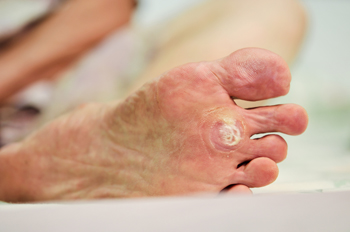
Warts on the feet can appear in different forms, and knowing the difference helps in choosing the right treatment. Plantar warts usually form on the soles of the feet where pressure is greatest. They may grow inward due to walking, and often feel like a painful pebble under the skin. These warts sometimes show small black dots, which are tiny clotted blood vessels. Other types of warts, such as common warts, may develop on the top of the foot or around the toes, and are usually raised and rough to the touch. While both are caused by strains of the human papillomavirus, treatment may vary depending on the location and severity. If you notice unusual growths on your feet, it is suggested that you schedule an appointment with a podiatrist for proper evaluation and appropriate treatment.
Plantar warts can be very uncomfortable. If you need your feet checked, contact Barbara J. Aung, DPM from Aung Foot Health Clinic . Our doctor will assist you with all of your foot and ankle needs.
About Plantar Warts
Plantar warts are the result of HPV, or human papillomavirus, getting into open wounds on the feet. They are mostly found on the heels or balls of the feet.
While plantar warts are generally harmless, those experiencing excessive pain or those suffering from diabetes or a compromised immune system require immediate medical care. Plantar warts are easily diagnosed, usually through scraping off a bit of rough skin or by getting a biopsy.
Symptoms
- Lesions on the bottom of your feet, usually rough and grainy
- Hard or thick callused spots
- Wart seeds, which are small clotted blood vessels that look like little black spots
- Pain, discomfort, or tenderness of your feet when walking or standing
Treatment
- Freezing
- Electric tool removal
- Laser Treatment
- Topical Creams (prescription only)
- Over-the-counter medications
To help prevent developing plantar warts, avoid walking barefoot over abrasive surfaces that can cause cuts or wounds for HPV to get into. Avoiding direct contact with other warts, as well as not picking or rubbing existing warts, can help prevent the further spread of plantar warts. However, if you think you have developed plantar warts, speak to your podiatrist. He or she can diagnose the warts on your feet and recommend the appropriate treatment options.
If you have any questions, please feel free to contact our office located in Tuscon, AZ . We offer the newest diagnostic and treatment technologies for all your foot care needs.





